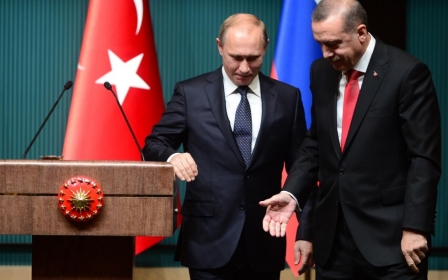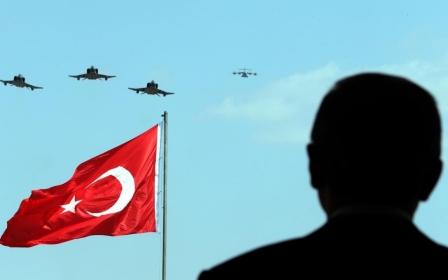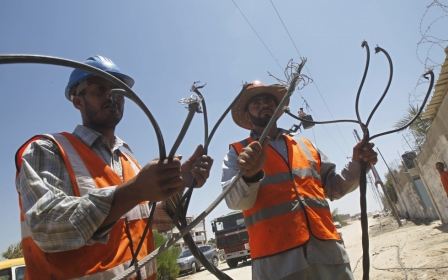Turkish president visits Iran despite regional tensions

Turkish President Recep Tayyip Erdogan is visiting Iran on Tuesday in a trip that is expected to focus predominately on trade relations, despite political tensions between Ankara and Tehran.
Turkey and Iran aim to reach $30 billion in annual bilateral trade by the end of the year, according to Riza Eser, the chairman of the Turkey–Iran business council executive board, who is "pleased with the visit as businessmen."
Despite a number of international sanctions against Tehran over its nuclear programme, trade volume between Iran and Turkey was $13.7 billion in 2014 – although down from the $22 billion in 2012, it is significantly higher than the mere $1 billion in 2000.
Trade between the two countries had been affected by sanctions, but the situation may change should the sanctions against Tehran be gradually lifted following the nuclear framework agreement between Iran and world powers on Thursday last week.
Turkish exports to Iran are mainly machinery, motor vehicles, iron and steel products, and electric devices – while 90 percent of Iranian exports to Turkey are of crude oil and natural gas.
'Negotiations in Yemen'
Erdogan is expected to hold a meeting with Iranian President Hassan Rouhani as well as Supreme Leader Ayatollah Ali Khamenei.
The leaders of both countries are also expected to address regional crises, many of which pit Turkey and Iran against each other.
One day ahead of the visit, Turkey's Foreign Minister Mevlut Cavusoglu said Iran's attitude in Yemen "may bring catastrophe" to the region, accusing Tehran of displaying a "sectarian" outlook.
Cavusoglu, who is accompanying Erdogan to Tehran, said Turkey "can contribute a lot to the negotiations in Yemen".
Erdogan's visit comes one day after he received Saudi Deputy Crown Prince and Interior Minister Prince Muhammad bin Nayef in Ankara.
The one hour and 40 minute long meeting, which was closed to the press, comes at a time when Saudi Arabia is leading a military campaign against the Houthi militia takeover of much of Yemen.
"Our priority in Yemen is the resolution of the crisis by gathering all the parties around the negotiation table as soon as possible," Turkey's presidential spokesman Ibrahim Kalin told a press conference on Monday.
However, the Turkish president is not likely to be able to influence the Iranian position with regards to Yemen.
Erdogan had called on Tehran to stop supporting the Houthi militia, accusing Iran of trying to dominate the Middle East, which led the Iranian Foreign Ministry to summon the Turkish envoy in Tehran, and a number of lawmakers have called on the government to cancel Erdogan’s visit to Tehran.
The "Ottoman Don Quixote is in Tehran" was the headline and cartoon of the Iranian newspaper Shahrvand.
'A middle course' between Saudi Arabia and Iran
Relations between Ankara and Tehran were strong prior to the Arab Spring in 2011, when Turkey backed the Syrian uprising against the rule of President Bashar al-Assad, who is firmly supported by Iran.
However, analysts predict that Turkish trade relations with Iran would improve, just as they had done recently with Russia, despite disagreements with Moscow over the war in Syria.
"Iran and Turkey have been good partners in trade despite the sanctions regime imposed on Iran. But there is no doubt that an economically strengthened Iran through sanctions relief can be a stronger partner for Turkey," said Adnan Tabatabai, an Iranian political analyst from the Berlin-based think tank Center for Applied Research in Partnership with the Orient.
Turkey also appears to wish to maintain the recently improved ties with Saudi Arabia following the coming to power of King Salman.
"Turkish President Recep Tayyip Erdogan is trying to chart a middle course between his country’s ties to Iran and his renewed relations with Saudi Arabia," wrote the Middle East Briefing.
And Erdogan has been "a bridge between the Sunni world and Shiite Iran in the past," Barbara Slavin, senior fellow at the Atlantic Council, was quoted as saying.
However, it remains unclear if the expected commercial success of the visit will be matched by any major regional diplomatic breakthrough.
Middle East Eye propose une couverture et une analyse indépendantes et incomparables du Moyen-Orient, de l’Afrique du Nord et d’autres régions du monde. Pour en savoir plus sur la reprise de ce contenu et les frais qui s’appliquent, veuillez remplir ce formulaire [en anglais]. Pour en savoir plus sur MEE, cliquez ici [en anglais].




